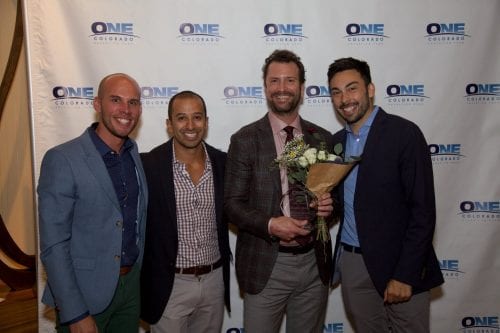While most Americans in the 1980s learned about AIDS on television news years after it erupted into a legitimate epidemic, Matthew Huron saw the virus on the faces of his friends and family while growing up in San Francisco’s vibrant Castro neighborhood.
“A lot of those men there were very sick and dying, and that included my father and his partner and all of their friends,” Huron said. “Every week my dad was going to another funeral, and it was just a really challenging time.”
Philanthropy in the cannabis industry
Cannabist Show: He designs weed apparel; He runs a pot shop brand
Helping in the community: Philanthropy from marijuana industry finding larger acceptance
Other Roots: RiverRock founder Norton Arbelaez on how marijuana still inspires him
Weed news and interviews: Get podcasts of The Cannabist Show.
Subscribe to our newsletter here.
Watch The Cannabist Show.
Peruse our Cannabist-themed merchandise (T’s, hats, hoodies) at Cannabist Shop.
It wasn’t long before Huron was that socially conscious teenager volunteering at an AIDS hospice in the heart of the Castro. Philanthropy was important to his father, and so it was also important to son. And as Huron grew up and started noticing how cannabis was helping his friends and family living with the disease — restoring appetites, diminishing pain, remedying nausea and generally treating the patients’ wasting syndrome — he opened a medical marijuana co-op in 2000.
“The fundamental reason we started that co-op was to give, not sell, medical marijuana to sick men dying from AIDS,” said Huron. “That’s what we did. We delivered to a variety of hospice care and assisted living facilities around San Francisco.”
Huron’s involvement in cannabis these days is more official. But the CEO of Good Chemistry Nurseries’ cannabis businesses in Colorado and Nevada is still donating medical marijuana (and leafy-green cash, as well) to those in need.
The Ally Award video tribute to Matthew Huron
He donates to One Colorado to support their political work on behalf of the LGBTQ community; In 2016, the organization bestowed upon Huron an Ally Award. He assembles a team for, and sponsors, the AIDS Walk every year. He donates to Urban Peak, a nonprofit fighting homelessness, as well as the Denver Police Brotherhood, the Comitis Crisis Center of Aurora and the Harm Reduction Action Center.
To boot, Good Chemistry’s Compassion Program is a direct descendant of the co-op he started more than 16 years ago.
“We’re one of the only dispensaries in Denver that has an organized and internal compassion program, which gives free and low-cost medicine to low-income and terminally ill patients,” Huron said. “My father passed away in July of ’09 (to complications from AIDS), and I moved the business here in December ’09 … It was important to me and to his legacy, and it was why I got into this industry in the first place — to continue the Compassion Program.”

As marijuana businesses continue to assimilate into America’s traditional corporate world, philanthropy and responsibility have become key initiatives for some ganjapreneurs. Some of these community-forward businesses are being celebrated this week at the second annual Cannabist Awards, which will celebrate the marijuana industry’s best and brightest – including awards for philanthropy, volunteerism and community innovation – from 6-10 p.m. Nov. 16 in Las Vegas during the Marijuana Business Conference & Expo.
While the weed industry faces stringent regulations and higher-than-average taxes, they also battle stigmas that are left over from a failed War on Drugs. Corporate responsibility is one way to overcome decades of misinformation and, even, to be a good neighbor, experts say.
“One of these days it won’t be cannabis and the community — it’ll be cannabis in the community,” said Kelly Perez, founder of the KindColorado Foundation, a new Denver-based organization that helps pot businesses with community engagement efforts. “What we get most excited about is the opportunity for communities (those disproportionately impacted by institutional neglect) that happens to be where many grows and processing facilities are located, to be served by the growing cannabis industry that gets to define itself as a business for good — people, profit, community.
“Working to change the cannabis narrative from the War on Drugs to a force for social change is pretty damn cool.”
Michael Ray agrees. The former Wall Street hedge fund trader now runs Bloom Farms, a California cannabis grower best known for its popular Highlighter vape pens and its collaboration with vape pen giant Pax on the new oil-based vape, the Era.
Ray grew up in an middle class home in Northern California’s Calaveras County, where he often found his family hosting his childhood friends for school-night dinners or sometimes entire weekends. Ray’s mom was an “excellent cook” and a homemaker, and there was always enough food to feed his friends, he remembers.
“I didn’t realize this until I got a little bit older and started to understand that in many poor counties throughout California, people just don’t have enough food,” Ray said. “We’re not necessarily starving in the streets, but many of us don’t have enough. One in five children goes to bed hungry every night. One in four households is considered food-insecure, meaning they don’t have enough.”
Craving to make a difference, Ray instituted a one-for-one policy at Bloom Farms — and for every vape cartridge sold Bloom donates a healthy meal to a local food bank. Bloom has already donated more than 250,000 meals to the likes of Sacramento Food Bank, SF-Marin Food Bank, Alameda County Food Bank and World Harvest Food Bank, and the company anticipates hitting the half-million mark by July 2017.
“We’ve made a very pointed and focused mission to fight food insecurity in California with numerous volunteer days where we all go together and work together in food banks in Calaveras County and Los Angeles, San Francisco and Alameda County,” said Ray, who also pays his employees four hours per month to volunteer in their communities. “As a consumer brand and product, people care. People connect with companies that are providing positive impact in their communities. It’s also just the right thing to do.”
Bloom Farms’ latest initiative is the #WhereDoYouBloom campaign; Every time a customer posts a hashtagged photo of their Highlighter vapes on Instagram or other social media networks the company will donate another meal to its food bank partners.
The team that runs the Clinic marijuana shops in Colorado, Illinois and Nevada understands the importance of social engagement and community involvement. The same group that graduated high school together ultimately started the marijuana business together, and when one of their own lost his father to progressive multiple sclerosis, it served as a catalyst to the group to do what they could do to help.
First they formed a team for Walk MS, and next they took their annual friends-only golf tourney, originally timed each August to a buddy’s birthday, and expanded it into a community-wide, industry-inclusive fundraiser for the National MS Society’s Colorado-Wyoming Chapter.

In seven years of walks and golf tournaments, the Clinic has helped raise $430,942 for the National MS Society, according to company records. But as essential as those cash donations are, bringing awareness about MS to the general public is as important, says the Clinic’s director of operations Ryan Cook.
“Progressive MS is a fast-moving disease,” Cook said, “and (our buddy’s) father had gone from a normal, working individual to a wheelchair very rapidly — unable to feed or bathe or dress himself.”
There’s something special about a cannabis company donating time and money to one of the world’s most important MS organizations. An historic 2015 analysis published in the Journal of the American Medical Association showed that, while cannabis hasn’t yet been proven scientifically to remedy most of the conditions governments have authorized it to treat, medical pot has been proven to help patients with severe pain, nausea and vomiting related to chemotherapy and spasticity from multiple sclerosis.
Promo video for the seventh annual Clinic Charity Classic
“With MS, it’s one of those conditions we deal with in society that I truly feel has an ability, within our lifetime if not faster, to be cured,” said the Clinic’s Cook. “But that requires research dollars. We all understand how important that is to our industry — it’s just as important to the MS Society.”
The spirit of giving can be infectious. Cook said nine other cannabis dispensary companies and 11 edibles manufacturers helped sponsor this year’s Clinic Charity Classic. And KindColorado Foundation’s Perez is also feeling the love. Her organization is already working with more than 10 marijuana businesses including Buddy Boy, Lightshade, Veritas, Simply Pure, Seed & Smith, Groundswell, Natural Remedies, Endocanna, Starbuds and Natural Remedies — and she’s looking at how these organizations can create systemic change in their neighborhoods.
For Good Chemistry’s Huron, he sees charitable giving as “a moral imperative” — and one that’s not limited to this burgeoning industry.
“My perspective is that this goes beyond cannabis,” Huron said. “Quite frankly, I think it’s a moral imperative for any successful business to do what they can to help in their community. That’s been my position from the beginning: As folks get successful, they should give back.”
